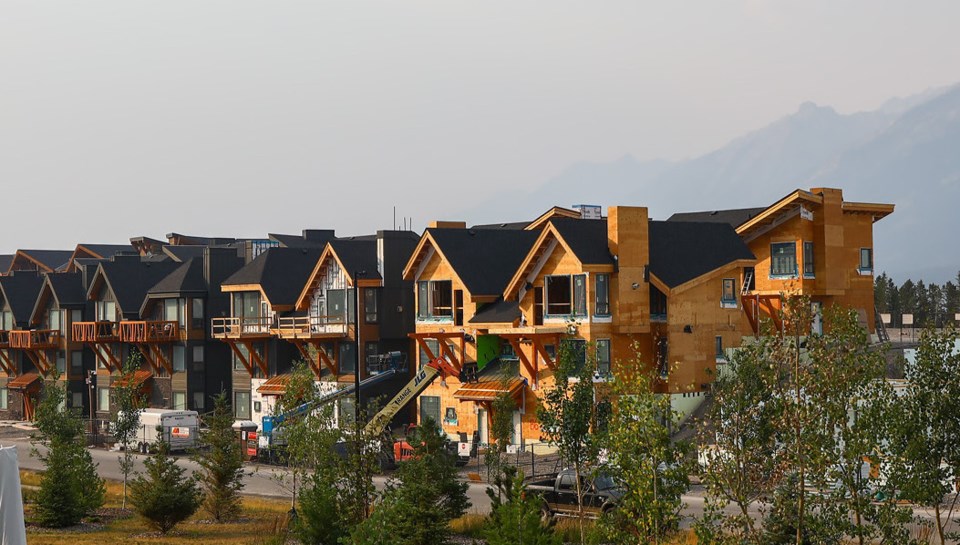The Town of Canmore is attempting to overturn an Alberta Land and Property Rights Tribunal’s order for it to adopt the Smith Creek and Three Sisters Village area structure plans.
The expansion of the two sites would be built over the next 10 to 30 years, with space for 12,000 more residents – about equal to Canmore’s current population - and covering 714 acres. Plans also call for commercial development, including a retail centre and a resort.
On June 7, council directed staff to proceed with the leave to appeal prior to the June 15 deadline, which will see the Town of Canmore's legal representation seek the ability to file a formal appeal with the province’s Court of Appeal.
“Council is not anti-development. We need development that is aligned with what our community needs. The 1992 NRCB (Natural Resources Conservation Board) decision recognizes the interests of the local community and maintained the discretion of the municipality to decide how land in Canmore would be developed, neither of which was recognized in the LPRT decisions,” Canmore Mayor Sean Krausert said. “What we need is affordable, below-market entry-level housing to a significantly greater extent than proposed in the two bylaws, which is entirely consistent with the NRCB decision.”
Krausert and councillors Tanya Foubert, Jeff Mah and Wade Graham voted in favour to file the leave to appeal.
Councillors Joanna McCallum, Karen Marra and Jeff Hilstad each declared a pecuniary interest because they are all named in the civil lawsuit by TSMVPL that was launched last December. The three councillors didn’t participate in the discussion and left the meeting.
Three Sisters Mountain Village Properties Ltd. (TSMVPL) has a $161 million lawsuit against the Town and the previous council, while Thunderstone Quarries has a $63.5 million lawsuit against the Town since it owns lands that are part of the Smith Creek proposal.
The leave to appeal would also include an application to stay the LPRT decisions, meaning until a court decision is rendered no development planning on the ASPs could continue.
Mah said he had heard from community members that the ASPs didn’t fit the need of the community.
"Canmore wants to be recognized as a leader in managing the impacts on the environment and TSMVPL's two proposed ASPs missed that mark in terms of size and scope,” he said.
In a statement, TSMVPL's president David Taylor, said if the leave to appeal is granted to the Town, TSMVPL remains confident in the two ASPs proceeding forward due to their alignment with the NRCB decision.
"TSMVPL respects last month's LPRT decisions. We took every step necessary to ensure our area structure plans for Three Sisters Village and Smith Creek adhered to the original decision of the Natural Resources Conservation Board permitting development of Three Sisters lands," he said. "If the court does decide to hear this appeal, TSMVPL absolutely believes that the court will conclude that the LPRT decisions were reasonable. The development of Three Sisters' lands were determined to be in the public interest by the NRCB and the LPRT agreed that our area structure plans are consistent with the NRCB decision."
The Town’s solicitor had two recommendations for council – have staff return with bylaws for council approval as ordered by the LPRT or to apply for a leave to appeal to seek an appeal with the Alberta courts.
If the Town’s leave to appeal is successful, the case would move to the Court of Appeals to be heard by a judge. However, the appeal court would limit public participation, new evidence and findings of fact, and specifically look at an issue or issues raised by the Town.
The LPRT ordered the Town to adopt the two ASPs on May 17, 2020, when it found that both plans were consistent with the 1992 NRCB decision.
The tribunal cited the 2020 Court of Appeal case Borgel v. Paintearth several times, which aimed to “prevent a municipality from blocking development that has been deemed in the public interest,” the appeal case stated.
The tribunal decisions also noted how the 1992 NRCB decision continues to remain in effect and the Town was legally obligated to pass the two ASPs since they were consistent with the provincial board.
The tribunal hearings lasted 15 days and had more than 110 hours of testimony in addition to thousands of pages of evidence presented.
Mah argued the NRCB decision was made a generation ago and doesn’t accurately reflect the needs of the community through a modern lens.
"Our community needs development…We cannot live in a time capsule, but any development that occurs must be the right kind,” he said.
- With file from Greg Colgan, Rocky Mountain Outlook, Canmore



